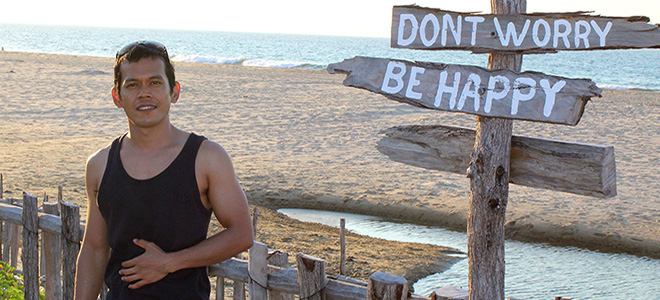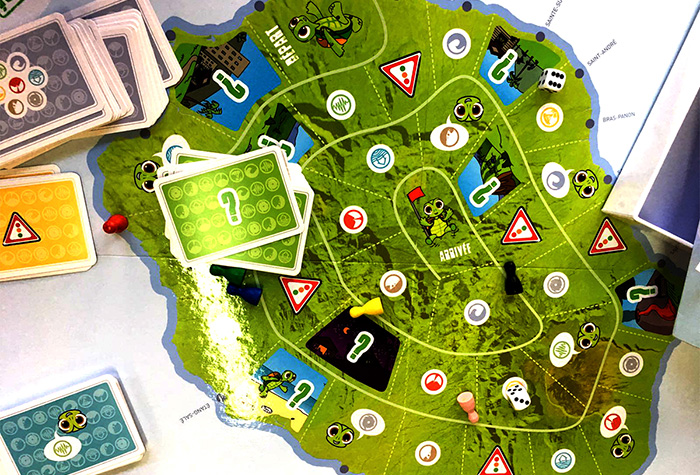
Red Cross/Red Crescent Climate Centre Internship Program
by Juhri Selamet
Maputo, Mozambique
 Juhri Selamet is the 2018 Junior Researcher in the Red Cross Red Crescent Climate Centre (RCRCCC) program. He is a PhD student in the College of Media, Communication and Information at University of Colorado Boulder. He has a bachelor’s degree from Bandung Institute of Technology, Indonesia and a master’s degree from the University of Illinois at Chicago. His research interests are visual communication, corporate social responsibility, climate change, water, conservation, media coverage of risk and the environment, and strategic environmental communication.
Juhri Selamet is the 2018 Junior Researcher in the Red Cross Red Crescent Climate Centre (RCRCCC) program. He is a PhD student in the College of Media, Communication and Information at University of Colorado Boulder. He has a bachelor’s degree from Bandung Institute of Technology, Indonesia and a master’s degree from the University of Illinois at Chicago. His research interests are visual communication, corporate social responsibility, climate change, water, conservation, media coverage of risk and the environment, and strategic environmental communication.
View photo gallery in the field by Juhri Selamet
Arielle, Delegada da Pesquiça (Research Delegate of Forecast-based Financing) told me there was an exciting event held at Centro Cultural Franco-Moçambicano, Maputo, and she asked whether or not I was interested in joining the event, which, of course, I was. The Centro Cultural Franco was only about a 15 minute drive from Cruz Vermelha De Moçambique. It was a Climate Changes games event hosted by France Red Cross. When I arrived at the Center around 9 a.m., Janio Danio Dambo, Gestor da CVM do Projecto FbP (Forecast-based Financing project manager of Mozambique Red Cross), was already there to join and facilitate the event.
The participants for the event were from several institutions, such as NGOs and governmental institutions. From the participants’ introductions, I learned that some of them were from Instituto Nacional de Gestão de Calamides (INGC) (National Disasters Management Institute), Instituto Nacional de Meteorologia de Moçambique (INAM) (National Meteorology Institute), Direcção Nacional de Águas (DNGRH) (National Water Directorate), and Red Cross. From my observation, there were 13 female participants and 16 male participants for this event. After gathering in the center’s lobby for a short explanation about the activity, we moved to the second floor to partake in the workshop.

By 10 a.m., we started to play the game called “Climate Message.” We were divided into two groups. Eric SAM-VAH, Adjoint au chef de delegation, Gestion des risques de catastrophes – Deputy Head of Delegation, Disaster Risk Management from France Red Cross had prepared a climate message on a piece of paper to be shared with the groups. The climate message was in three languages: French, Portuguese, and English. In English, I noted the message was:
“Currently we are experiencing a strong ENSO signal, and are in an El Nino phase. There is a 60% chance that there will be less than average rainfall and a 45% chance that the maximum temperatures will be lower than average for the months of November, December, and January. The long-term forecasts show that there is an increased chance that the central parts of the country might experience drier conditions or even drought conditions.”

The message was passed one-by-one to each of the participants. They made shocked faces when they heard the message. Janio kept reminding the groups that there would be no repeating of the message, “Only say it once,” he said. Once the message reached the end of the line, Eric asked the last person of the groups to write down the message that had reached them; he asked them to read it as well. After that, Eric asked the first person who received the message to read the original message. One of the questions that I remember Eric asking the groups was, “What made it easy or difficult to communicate a climate message?” which, from my note, the groups responded the message was too long and too “complicado.”

At the end of the climate message game, Eric, as facilitator, explained to us the game’s relevance to climate resilience and that complex climate messages could often cause more confusion than clarity. This light-hearted exercise could open the space for an exploration of the effectiveness of seasonal forecasts and how to communicate them effectively without oversimplifying the message. The objectives of this activity were learning to explore how complex climate messages are transferred and to explore options for appropriate use of climate messages. From this activity, as players for the games, we have learned the challenges associated with climate communication. It encourages us to take action and develop solutions to provide knowledge and understanding of the climate issue that could be adapted to local context.
There were many laughs and much discussion, and for sure, we had fun at that event. I was fortunate to attend and participate in this activity. Read more …


RC/RCCC Notes From the Field: Climate Message and Land of Good People
Red Cross/Red Crescent Climate Centre Internship Program
by Juhri Selamet
Maputo, Mozambique
View photo gallery in the field by Juhri Selamet
Arielle, Delegada da Pesquiça (Research Delegate of Forecast-based Financing) told me there was an exciting event held at Centro Cultural Franco-Moçambicano, Maputo, and she asked whether or not I was interested in joining the event, which, of course, I was. The Centro Cultural Franco was only about a 15 minute drive from Cruz Vermelha De Moçambique. It was a Climate Changes games event hosted by France Red Cross. When I arrived at the Center around 9 a.m., Janio Danio Dambo, Gestor da CVM do Projecto FbP (Forecast-based Financing project manager of Mozambique Red Cross), was already there to join and facilitate the event.
The participants for the event were from several institutions, such as NGOs and governmental institutions. From the participants’ introductions, I learned that some of them were from Instituto Nacional de Gestão de Calamides (INGC) (National Disasters Management Institute), Instituto Nacional de Meteorologia de Moçambique (INAM) (National Meteorology Institute), Direcção Nacional de Águas (DNGRH) (National Water Directorate), and Red Cross. From my observation, there were 13 female participants and 16 male participants for this event. After gathering in the center’s lobby for a short explanation about the activity, we moved to the second floor to partake in the workshop.
By 10 a.m., we started to play the game called “Climate Message.” We were divided into two groups. Eric SAM-VAH, Adjoint au chef de delegation, Gestion des risques de catastrophes – Deputy Head of Delegation, Disaster Risk Management from France Red Cross had prepared a climate message on a piece of paper to be shared with the groups. The climate message was in three languages: French, Portuguese, and English. In English, I noted the message was:
“Currently we are experiencing a strong ENSO signal, and are in an El Nino phase. There is a 60% chance that there will be less than average rainfall and a 45% chance that the maximum temperatures will be lower than average for the months of November, December, and January. The long-term forecasts show that there is an increased chance that the central parts of the country might experience drier conditions or even drought conditions.”
The message was passed one-by-one to each of the participants. They made shocked faces when they heard the message. Janio kept reminding the groups that there would be no repeating of the message, “Only say it once,” he said. Once the message reached the end of the line, Eric asked the last person of the groups to write down the message that had reached them; he asked them to read it as well. After that, Eric asked the first person who received the message to read the original message. One of the questions that I remember Eric asking the groups was, “What made it easy or difficult to communicate a climate message?” which, from my note, the groups responded the message was too long and too “complicado.”
At the end of the climate message game, Eric, as facilitator, explained to us the game’s relevance to climate resilience and that complex climate messages could often cause more confusion than clarity. This light-hearted exercise could open the space for an exploration of the effectiveness of seasonal forecasts and how to communicate them effectively without oversimplifying the message. The objectives of this activity were learning to explore how complex climate messages are transferred and to explore options for appropriate use of climate messages. From this activity, as players for the games, we have learned the challenges associated with climate communication. It encourages us to take action and develop solutions to provide knowledge and understanding of the climate issue that could be adapted to local context.
There were many laughs and much discussion, and for sure, we had fun at that event. I was fortunate to attend and participate in this activity. Read more …